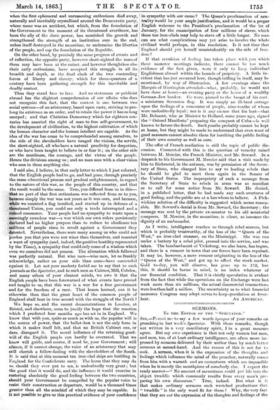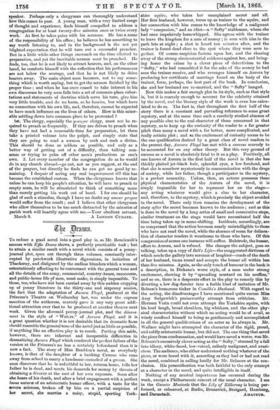SERMONS.
To THE EDITOR OF THE "SPECTATOR."
rmit me to say a few words hpropos of your remarks on preaching in last week's Spectator. With those remarks, though not written in a very conciliatory spirit, I in a great measure agree. But my own experience is that not only women but men, and men, too, of at least ordinary intelligence, are often more im - pressed by sermons delivered by their author than by much better sermons at second-hand. And the reason of this is not far to seek. A sermon, when it is the expression of the thoughts and feelings which influence the mind of the preacher, naturally comes from him with a warmth and an earnestness which are impossible when he is merely the mouthpiece of somebody else. I expect the ready answer—" No amount of earnestness. could put life into the abject twaddle which commonly results from every man's pre- paring his own discourses." True, indeed. But what is it that makes ordinary sermons such wretched productions that " twaddle " is the only word fit for them ? Why, the very fact that they are not the expression of the thoughts and feelings of the
speaker. Perhaps only a clergyman can thoroughly understand how this comes to pass. A young man, with a very limited range of thought and experience, finds himself compelled to address a congregation for at least twenty-five minutes once or twice every week. At first he takes pains with his sermons. He has a sense of the responsibility of his office ; he believes he has something to say worth listening to, and in the background is the not yet blighted expectation that he will turn out a successful preacher. But in a little while other things encroach on the time allotted to preparation, and yet the inevitable sermon must be preached. He finds, too, that he is not likely to attract hearers, and, on the other hand, he comforts himself with the reflection that his performances are not below the average, and that he is not likely to drive hearers away. The main object soon becomes, not to say some- thing which is worth saying, but to get the sermon finished by the proper time ; and when he has once ceased to take interest in his own discourses he very soon falls into a set of common-place exhor- tations and statements of doctrine which serve his turn, give him very little trouble, and do no harm, as he fancies, but which have no connection with his own life, and, therefore, cannot be expected to have much influence on the lives of others. How is this miser- able settling down into common-place to be prevented ?
1st. The clergy, especially the younger clergy, must not be re- quired to preach so frequently. If they are driven to preach when they have not had a reasonable time for preparation, let them take a printed volume into the pulpit, and simply state that they are going to read a sermon by such and such a divine. This should be done as seldom as possible, and only as a better way of getting out of a difficulty, than talking non- sense or trying to palm off other men's productions as one's own. 2. Let every member of the congregation do as he would do in any church abroad—go out, not as you suggest, at the end of the prayers, but directly he finds he can get no good by re- maining. I despair of seeing any real improvement till this has become the established custom. When the clergyman knows that unless he can keep his people's attention, he will have to preach to empty seats, he will be stimulated to think of something more than merely getting his work out of hand. I for one should be glad of such a stimulus, though I have no doubt my amour propre would suffer from the result ; and I believe that other clergymen who allow themselves to be too much distracted by the minutim of parish work will heartily agree with me.—Your obedient servant,































 Previous page
Previous page